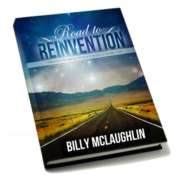Follow Your Dream and Do The Hard Work
Billy McLaughlin’s story of reinvention inspires new audiences as he returns to the stage.
Musician Billy McLaughlin is making inroads into the motivational speaking business with his story of personal revelation and the reinvention of his famed musical career. His insights—born of loss, grief, passion and determination—redefine the meaning of the word “luck” as he encourages people to put the story of his “music” in the context of their own dreams and challenges. Having recently launched his speaking career, Billy already has spoken to audiences internationally. His clients include corporations such as Microsoft, Accenture, Wells Fargo, Securian Financial and Keller Williams Realty. In response to his presentation, Chance Garrity, general manager of Microsoft’s north central district, commented, “Billy was absolutely amazing. The feedback has been off the charts …it was pure magic.” In addition, Billy has spoken to arts and health organizations including TED, Mayo Clinic and the American Academy of Neurology.
Coming to Grips:
At an early age, Billy McLaughlin achieved recognition as an international recording star. The five-time award-winning composer had been listed among Billboard’s Top 10. His signature style of playing with both hands on the fretboard of the guitar achieved a distinctive harp-like sound that attracted fans from around the world. In 1999, after fifteen years of constant touring, often performing twice-a-day, Billy started experiencing problems with his left hand. In 2001, he was diagnosed with an incurable illness called focal dystonia, a neuromuscular disorder marked by uncontrollable spasms and erratic movements. Ironically, after months of searching, the diagnosis came as welcome news. Finally, there was an explanation as to what had been happening to him.
Practically overnight, the musical techniques that worked so beautifully for him in the past no longer worked at all. Stunned and humiliated onstage in front of hundreds of people, Billy had lost the ability to play the music he had written and performed thousands of times before. The former world-class musician had to wrestle with the truth that he could no longer produce even a beginner’s chord. In addition, having been known throughout the world as a solo artist, Billy was confronted with another startling fact: He was losing his identity. This revelation forced him to reconnect with the reason why he did music in the first place. A new question surfaced in his mind: “Are you still you when you can’t do what you are known for?”
A Shift in Consciousness:
What otherwise might have been an unhappy ending to Billy’s once astounding career was, instead, the beginning of a new chapter in his life’s story. At first, he couldn’t even use his music to lift himself emotionally from the tough circumstances—something he had been in the habit of doing ever since he was a teen. For the following two years, Billy searched for ways to fix what had been broken in his life. Finally, he decided that if reclaiming his music wasn’t possible, he would pursue the impossible.
The turning point for Billy happened when he realized that he had to stop thinking about what was broken and, instead, focus on what still worked. Despite numerous attempts by specialists at treating his disorder, Billy’s right hand did not improve. Consequently, he turned his attention to his left hand and started his musical life over as a left-handed guitar player. Looking past the denial and disappointment of his current situation, Billy had a new vision. “I opened up my mind and my heart, and I found that what was impossible yesterday became possible today,” he said.
Deciding on a New Dream:
At some point everyone has to decide what they want, who they want to be and whether or not they are willing to do what is necessary, large or small, to move themselves in the direction of their desire. According to Billy, the difference between proactively choosing a path and giving up altogether can be as dramatic as night and day. “I found myself on the right road only after I asked myself the toughest question, ‘So…what’s it going to be?’” Billy realized at an early age that music could be a force for harmonizing people, “for harmonizing souls,” on a global level. He decided that he wanted to participate in that mysterious power— to play, write and live music, in whatever capacity possible.
“I didn’t want to be broken, I didn’t choose to be broken, but I found myself unable to do what I love to do,” Billy acknowledged. His inspiration was simple: If he learned to do it once, maybe he could learn to do it again. Billy decided to start over. “I wouldn’t be honest if I didn’t say I gave up a few times,” he admitted. On one such occasion, after hours of struggling unsuccessfully, he finally slammed his guitar into its case and escaped to his favorite Chinese restaurant. At the end of his meal, the waiter handed Billy a fortune cookie. He cracked it open and read, “Many people fail because they quit too soon.” The message was opportune.
Doing the Work
As one who’s achieved numerous accolades, Billy is quick to say that persistence is the only thing that will get you to your dreams. “Talent, alone, is not enough; the world is full of unsuccessful geniuses. Determination and persistence are the only keys to the door of your future,” he explains. Only through persistence has Billy defied the experts and his own self-doubt, becoming a virtuoso for a second time.Billy’s miraculous comeback did not involve technology, only the strength of mind and character, which allowed him to overcome his physical limitations and to deliver music that is distinctly his own.
In light of his return, Billy is ever conscious of the fact that there is nothing guaranteeing that any of it will last. All that he’s rebuilt could be gone if the dystonia migrates to his healthy hand. Should that day ever come, he is resolute in his decision to never give up. He will not permit the risk of failure to overshadow his desire to achieve. “The challenge for me and for every artist is to get out of the way of their music,” says Billy. “For the sake of our audience, that’s what we all need to do.”
In many ways, the worst thing that ever happened to Billy ended up being the best thing that ever happened to him. Left handed, Billy continues to express and evolve his artistry. The music is still in him. In releasing it, he opens up your heart and mind to the possibilities that exist for you. This begs the question, “What big dream keeps you going?” For more information, or to inquire about Billy’s schedule, contact Hannah Day.





